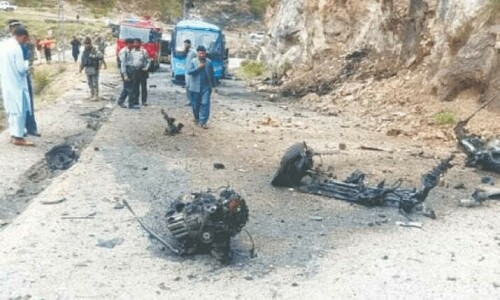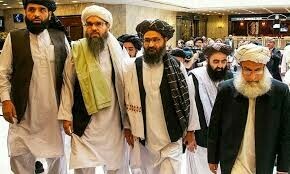IT has become a grim tradition: each time something extraordinary happens — extraordinary even by the violent standards of Karachi — the military and political leaderships of the country arrive in the provincial capital of Sindh.
The procession of leaders is usually led by army chief Gen Raheel Sharif and often features Interior Minister Nisar Ali Khan.
Occasionally, Prime Minister Nawaz Sharif also makes his way to the country’s largest city. By now, the ceremonies have also become familiar. Briefings are held for sombre-looking attendees.
Vows are made to crack down yet more fiercely against unnamed and unknown criminal and militant elements. The ISPR puts out a press release.
The interior minister holds a news conference. Rapid arrests are made and some of the arrested are presented to the media, but with their faces covered.
Cases are registered and either familiar groups or unfamiliar offshoots are blamed for the violence that the city has witnessed. Then, after a while, when the familiar and unfamiliar criminal and militant groups strike again, the tradition is repeated once more.
Without a doubt, Karachi is in many ways a more secure, less unpredictable city than it was some years ago.
Political violence is down as is the generalised fear that had seeped into the city’s denizens. Moreover, a city on the scale and size of Karachi is always likely to produce some incidents that shock the conscience and challenge its administrators.
The state simply does not exist in a sophisticated and organised enough manner in Karachi to regulate law and order to standards that are world class. But the assassination of Amjad Sabri and the kidnapping of the son of Sindh High Court Chief Justice Sajjad Ali Shah are a direct and flagrant challenge to the authority of the state — and those insisting that Karachi is on an irreversible upward security trajectory.
It is not because Sabri was a famed qawwal and Awais Ali Shah the scion of an important official that the two crimes matter more.
In assassinating Sabri, the killers were deliberately trying to instil fear in a wider community, both in Karachi and in those who adhere to the values that Sabri exemplified.
In kidnapping Mr Shah, the perpetrators are attempting to intimidate the superior judiciary perhaps to make them more reluctant to take on organised crime and militant groups.
Both state and society, then, have also been attacked in the recent twin blows to Karachi. A determined, lawful response is called for.
Published in Dawn, June 28th, 2016










































